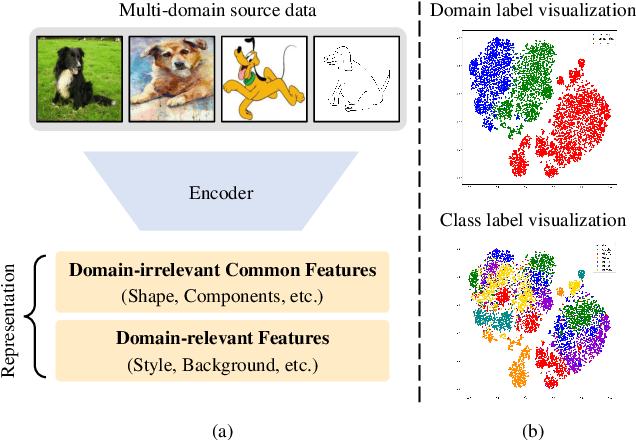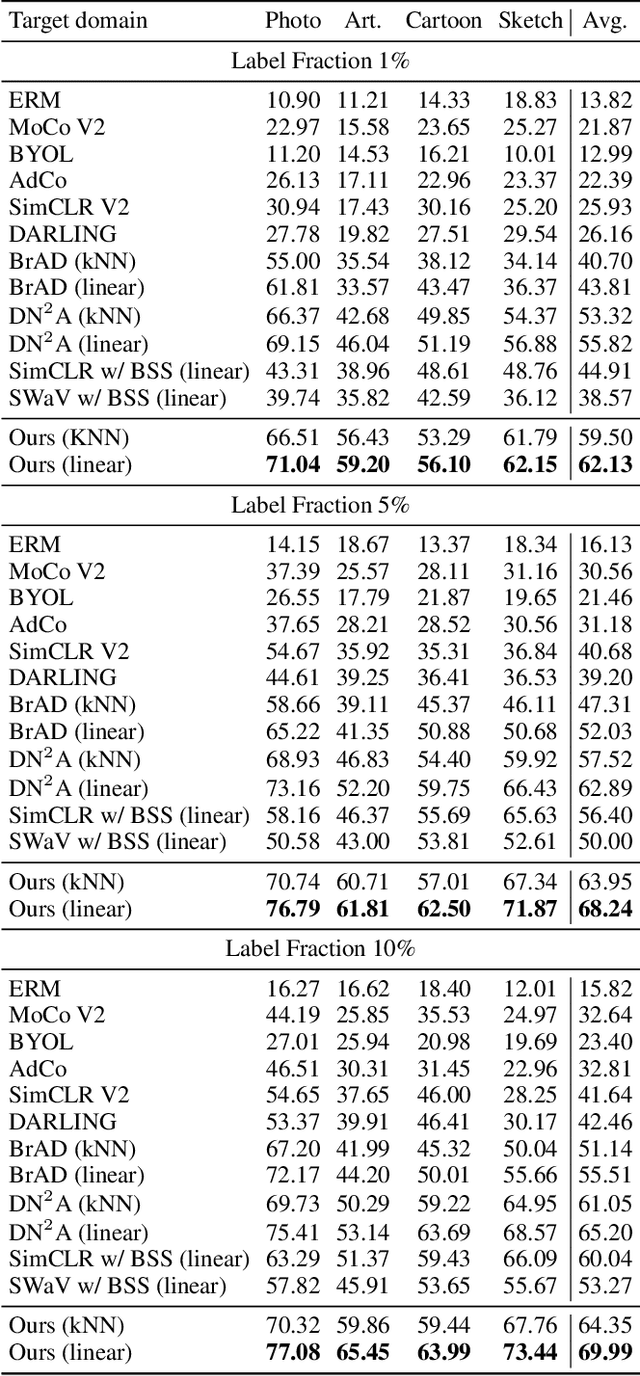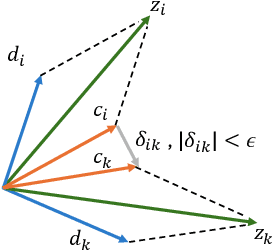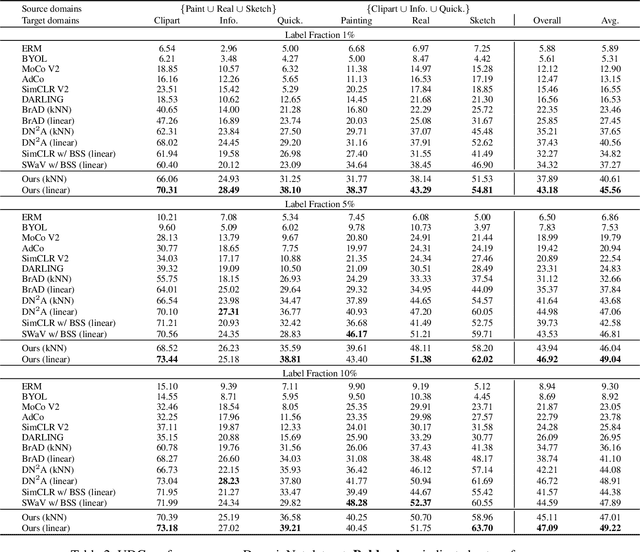Jee-Hyong Lee
Stabilizing Open-Set Test-Time Adaptation via Primary-Auxiliary Filtering and Knowledge-Integrated Prediction
Aug 26, 2025Abstract:Deep neural networks demonstrate strong performance under aligned training-test distributions. However, real-world test data often exhibit domain shifts. Test-Time Adaptation (TTA) addresses this challenge by adapting the model to test data during inference. While most TTA studies assume that the training and test data share the same class set (closed-set TTA), real-world scenarios often involve open-set data (open-set TTA), which can degrade closed-set accuracy. A recent study showed that identifying open-set data during adaptation and maximizing its entropy is an effective solution. However, the previous method relies on the source model for filtering, resulting in suboptimal filtering accuracy on domain-shifted test data. In contrast, we found that the adapting model, which learns domain knowledge from noisy test streams, tends to be unstable and leads to error accumulation when used for filtering. To address this problem, we propose Primary-Auxiliary Filtering (PAF), which employs an auxiliary filter to validate data filtered by the primary filter. Furthermore, we propose Knowledge-Integrated Prediction (KIP), which calibrates the outputs of the adapting model, EMA model, and source model to integrate their complementary knowledge for OSTTA. We validate our approach across diverse closed-set and open-set datasets. Our method enhances both closed-set accuracy and open-set discrimination over existing methods. The code is available at https://github.com/powerpowe/PAF-KIP-OSTTA .
TAG: A Simple Yet Effective Temporal-Aware Approach for Zero-Shot Video Temporal Grounding
Aug 11, 2025Abstract:Video Temporal Grounding (VTG) aims to extract relevant video segments based on a given natural language query. Recently, zero-shot VTG methods have gained attention by leveraging pretrained vision-language models (VLMs) to localize target moments without additional training. However, existing approaches suffer from semantic fragmentation, where temporally continuous frames sharing the same semantics are split across multiple segments. When segments are fragmented, it becomes difficult to predict an accurate target moment that aligns with the text query. Also, they rely on skewed similarity distributions for localization, making it difficult to select the optimal segment. Furthermore, they heavily depend on the use of LLMs which require expensive inferences. To address these limitations, we propose a \textit{TAG}, a simple yet effective Temporal-Aware approach for zero-shot video temporal Grounding, which incorporates temporal pooling, temporal coherence clustering, and similarity adjustment. Our proposed method effectively captures the temporal context of videos and addresses distorted similarity distributions without training. Our approach achieves state-of-the-art results on Charades-STA and ActivityNet Captions benchmark datasets without rely on LLMs. Our code is available at https://github.com/Nuetee/TAG
DCG-SQL: Enhancing In-Context Learning for Text-to-SQL with Deep Contextual Schema Link Graph
May 26, 2025Abstract:Text-to-SQL, which translates a natural language question into an SQL query, has advanced with in-context learning of Large Language Models (LLMs). However, existing methods show little improvement in performance compared to randomly chosen demonstrations, and significant performance drops when smaller LLMs (e.g., Llama 3.1-8B) are used. This indicates that these methods heavily rely on the intrinsic capabilities of hyper-scaled LLMs, rather than effectively retrieving useful demonstrations. In this paper, we propose a novel approach for effectively retrieving demonstrations and generating SQL queries. We construct a Deep Contextual Schema Link Graph, which contains key information and semantic relationship between a question and its database schema items. This graph-based structure enables effective representation of Text-to-SQL samples and retrieval of useful demonstrations for in-context learning. Experimental results on the Spider benchmark demonstrate the effectiveness of our approach, showing consistent improvements in SQL generation performance and efficiency across both hyper-scaled LLMs and small LLMs. Our code will be released.
Q-FAKER: Query-free Hard Black-box Attack via Controlled Generation
Apr 18, 2025Abstract:Many adversarial attack approaches are proposed to verify the vulnerability of language models. However, they require numerous queries and the information on the target model. Even black-box attack methods also require the target model's output information. They are not applicable in real-world scenarios, as in hard black-box settings where the target model is closed and inaccessible. Even the recently proposed hard black-box attacks still require many queries and demand extremely high costs for training adversarial generators. To address these challenges, we propose Q-faker (Query-free Hard Black-box Attacker), a novel and efficient method that generates adversarial examples without accessing the target model. To avoid accessing the target model, we use a surrogate model instead. The surrogate model generates adversarial sentences for a target-agnostic attack. During this process, we leverage controlled generation techniques. We evaluate our proposed method on eight datasets. Experimental results demonstrate our method's effectiveness including high transferability and the high quality of the generated adversarial examples, and prove its practical in hard black-box settings.
SALAD: Improving Robustness and Generalization through Contrastive Learning with Structure-Aware and LLM-Driven Augmented Data
Apr 16, 2025Abstract:In various natural language processing (NLP) tasks, fine-tuning Pre-trained Language Models (PLMs) often leads to the issue of spurious correlations, which negatively impacts performance, particularly when dealing with out-of-distribution data. To address this problem, we propose SALAD}(Structure Aware and LLM-driven Augmented Data), a novel approach designed to enhance model robustness and generalization by generating structure-aware and counterfactually augmented data for contrastive learning. Our method leverages a tagging-based approach to generate structure-aware positive samples and utilizes large language models (LLMs) to generate counterfactual negative samples with diverse sentence patterns. By applying contrastive learning, SALAD enables the model to focus on learning the structural relationships between key sentence components while minimizing reliance on spurious correlations. We validate our approach through experiments on three tasks: Sentiment Classification, Sexism Detection, and Natural Language Inference. The results demonstrate that SALAD not only improves model robustness and performance across different environments but also enhances generalization to out-of-distribution datasets and cross-domain scenarios.
DeCAP: Context-Adaptive Prompt Generation for Debiasing Zero-shot Question Answering in Large Language Models
Mar 25, 2025Abstract:While Large Language Models (LLMs) excel in zero-shot Question Answering (QA), they tend to expose biases in their internal knowledge when faced with socially sensitive questions, leading to a degradation in performance. Existing zero-shot methods are efficient but fail to consider context and prevent bias propagation in the answers. To address this, we propose DeCAP, a method for debiasing LLMs using Context-Adaptive Prompt Generation. DeCAP leverages a Question Ambiguity Detection to take appropriate debiasing actions based on the context and a Neutral Answer Guidance Generation to suppress the LLMs make objective judgments about the context, minimizing the propagation of bias from their internal knowledge. Our various experiments across eight LLMs show that DeCAP achieves state-of-the-art zero-shot debiased QA performance. This demonstrates DeCAP's efficacy in enhancing the fairness and accuracy of LLMs in diverse QA settings.
DomCLP: Domain-wise Contrastive Learning with Prototype Mixup for Unsupervised Domain Generalization
Dec 12, 2024



Abstract:Self-supervised learning (SSL) methods based on the instance discrimination tasks with InfoNCE have achieved remarkable success. Despite their success, SSL models often struggle to generate effective representations for unseen-domain data. To address this issue, research on unsupervised domain generalization (UDG), which aims to develop SSL models that can generate domain-irrelevant features, has been conducted. Most UDG approaches utilize contrastive learning with InfoNCE to generate representations, and perform feature alignment based on strong assumptions to generalize domain-irrelevant common features from multi-source domains. However, existing methods that rely on instance discrimination tasks are not effective at extracting domain-irrelevant common features. This leads to the suppression of domain-irrelevant common features and the amplification of domain-relevant features, thereby hindering domain generalization. Furthermore, strong assumptions underlying feature alignment can lead to biased feature learning, reducing the diversity of common features. In this paper, we propose a novel approach, DomCLP, Domain-wise Contrastive Learning with Prototype Mixup. We explore how InfoNCE suppresses domain-irrelevant common features and amplifies domain-relevant features. Based on this analysis, we propose Domain-wise Contrastive Learning (DCon) to enhance domain-irrelevant common features. We also propose Prototype Mixup Learning (PMix) to generalize domain-irrelevant common features across multiple domains without relying on strong assumptions. The proposed method consistently outperforms state-of-the-art methods on the PACS and DomainNet datasets across various label fractions, showing significant improvements. Our code will be released. Our project page is available at https://github.com/jinsuby/DomCLP.
A Behavior Analysis-Based Game Bot Detection Approach Considering Various Play Styles
Sep 08, 2015



Abstract:An approach for game bot detection in MMORPGs is proposed based on the analysis of game playing behavior. Since MMORPGs are large scale games, users can play in various ways. This variety in playing behavior makes it hard to detect game bots based on play behaviors. In order to cope with this problem, the proposed approach observes game playing behaviors of users and groups them by their behavioral similarities. Then, it develops a local bot detection model for each player group. Since the locally optimized models can more accurately detect game bots within each player group, the combination of those models brings about overall improvement. For a practical purpose of reducing the workloads of the game servers in service, the game data is collected at a low resolution in time. Behavioral features are selected and developed to accurately detect game bots with the low resolution data, considering common aspects of MMORPG playing. Through the experiment with the real data from a game currently in service, it is shown that the proposed local model approach yields more accurate results.
 Add to Chrome
Add to Chrome Add to Firefox
Add to Firefox Add to Edge
Add to Edge